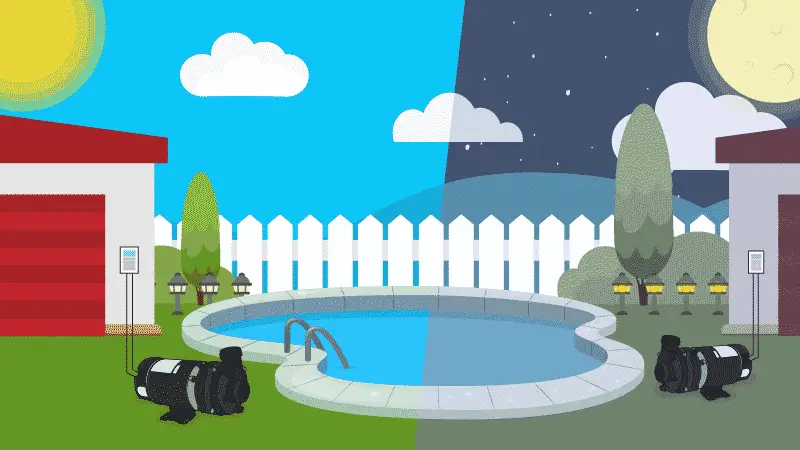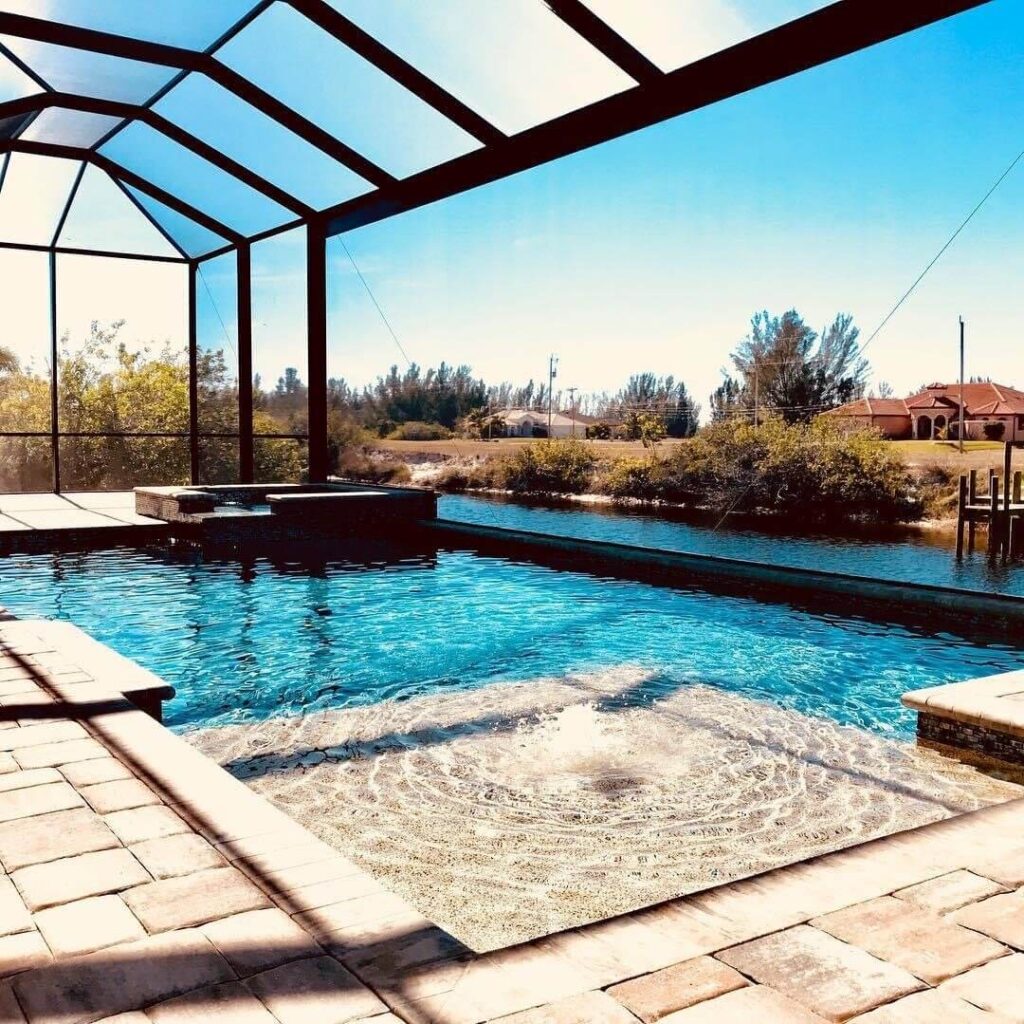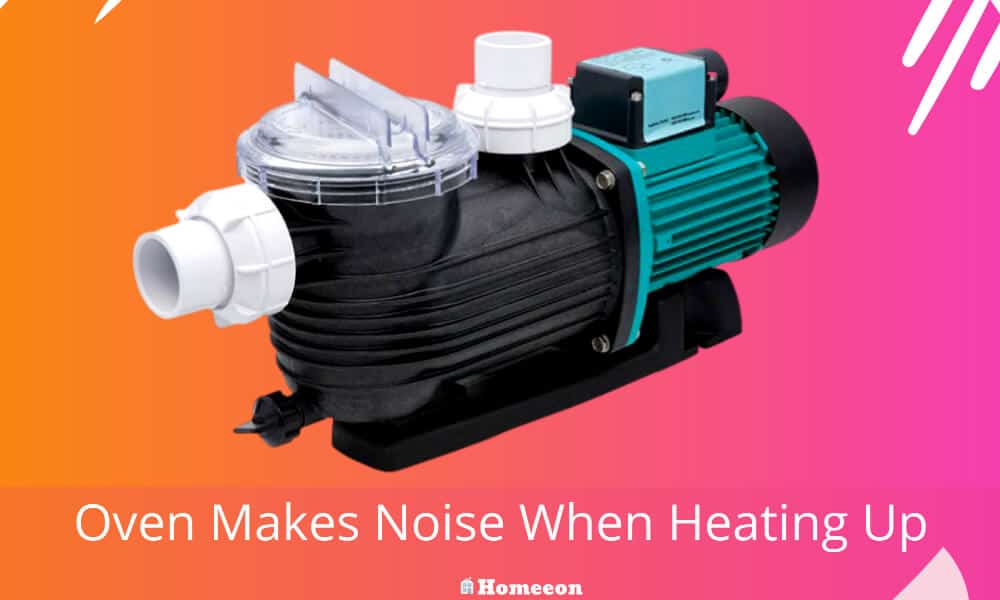Last Updated on August 14, 2023 By Emma W. Thomas
Running your pool pump during the day is generally more efficient. Daytime hours provide sunlight for chlorination, and warmer temperatures aid in water circulation, reducing the risk of algae growth. Running the pump for 6-8 hours during the day is a common recommendation.
Should I Run My Pool Pump Day Or Night?

Choosing the right time to run your pool pump is crucial. It not only impacts the cleanliness and clarity of your pool but also influences energy efficiency and costs. Here we discuss whether it’s best to run the pool pump during the day or night.
1) Energy Efficiency
Energy efficiency is an essential factor when deciding when to run your pool pump. Many people believe running the pump at night can save electricity due to off-peak hours. However, some areas no longer offer lower rates during these hours.
2) Sunlight Exposure
The sun affects the chemical balance within your pool. If your pump runs during the day, it helps to evenly distribute chemicals prevented from evaporating by sunlight. Thus, daytime operation may be best for maintaining water balance.
3) Noise Levels
Noise could be a restrictive factor. Pumps are frequently noisy, and running them at night might disturb neighbors. Consider daytime running if your pump is loud and you live in a residential area.
4) Pool Usage
When is your pool most frequently used? If it’s during the day, consider running the pump at night to ensure it’s clean for the next day. Conversely, if you use your pool at night, running it during the day may work best.
5) Chlorine treatment:
If you use chlorine to clean your pool, running your pump during the day will help spread this chemical evenly throughout. This is important because sunlight rapidly dissipates chlorine.
| Consideration | Day Time | Night Time |
|---|---|---|
| Energy efficiency | Check utility rate first | Off-peak hour consideration |
| Sunlight Exposure | Reduces chemical evaporation | Chemical balance potentially impacted |
| Noise Levels | Might be less disturbance | Could disturb neighbours |
| Pool usage | Ideal if pool used at night | Ideal if pool used in the day |
| Chlorine Treatment | Spreads chlorine evenly | Sunlight cannot help distribute |
In conclusion, both daytime and nighttime have their advantages and disadvantages when it comes to running your pool pump. Weigh these factors and make the decision that best aligns with your usage pattern, energy costs, and environmental conditions.
What hours is it best to run a pool pump?
| Time of Day | Reasons to Run the Pump |
|---|---|
| Early Morning (4 to 7 AM) | The early morning hours are typically when electricity rates are the lowest, thus saving on your energy bill. In addition, running your pump at this time creates a circulation that prevails algae growth. |
| Midday (1 to 3 PM) | During the daytime hours, the heat causes the water to evaporate and lose chemicals more rapidly. Running a pool pump midday can help ensure all water chemicals are evenly distributed, preventing harmful bacteria and algae from forming. |
| Late Afternoon or Early Evening (6 to 8 PM) | These hours fall in between peak time for sunlight and heat where the sun often instigates chlorine burn-off. The pump helps mix and replenish the chlorine throughout the pool. It also helps to keep your pool clean, circulating any debris towards the filters. |
It’s important to remember that local electricity rates and weather conditions can influence the best time to run a pool pump. Always consider these factors when deciding your pool pump schedule and ensure it runs for at least 8-10 hours for optimal maintenance. It also recommended to spread out your pumping time across different parts of the day to maintain the cleanest pool possible.
When Can Night Time Be Ideal For Running A Pool Pump?
You may run your pool pump during the night when you want to save on electricity expenses. Chlorine distribution in your pool lasts longer in the night because the chemical does not disintegrate like during the day. Your salt chlorinator will run longer at night than during the day, which results in a lot of energy consumption.
Pumping your pool at night is also helpful when you are carrying out a chemical treatment, as this enables you to keep the levels of chlorine high.
How To Increase Your Pool Pump’s Efficiency
If your pool pump runs for more extended periods, it may lead to higher energy bills. You can increase your pump’s efficiency by observing the following measures;
1. Manage Your Pump’s Horsepower
On average, your pool pump needs to run for 8 hours to circulate clean water regardless of intervals or the time of day. You can use a timer to help check the time, keep the pool clean, and reduce the energy bills. If, however, your pump’s horsepower is more than the size of your pool, you will need to reduce the run time. You can cut this time by 2 hours but ensure that the pool’s condition is not compromised.
You can start by reducing the pump’s run time at intervals of 30 minutes per day for better efficiency. But ensure that the water quality remains the same. Carrying out this step helps you identify the best run time for your pump which keeps your pool at its best and also cuts your budget.
2. Hand-Clean Your Pool
You can vacuum your pool or use pool cleaners to clear out debris and dirt. Doing this helps your pool pump to last longer and reduces the cost of running it. It would be best if you also emptied the pool’s filter baskets every day to prevent clogging in the drains, straining the pump, and using more energy.
3. Buy The Right Size Of Pump.
When purchasing a pool pump, ensure that you get the correct size. A home pool requires 1HP (one horsepower) pump or smaller. If the figure is higher than one, you can consider buying a better pump. A bigger pool pump works efficiently in cleaning through filters. A modern-day pump has variable speeds that allow you to adjust the flow rate without consuming much energy.
Ensure that your pool pump does not run all the time as this might cause wear and tear, although it will keep it in pristine condition. Running your pump for 24 hours will also lead to excessive bills, which will make it costly to maintain.
How Many Hours A Day Should Your Pool Pump Run?
To maintain your pool waters in the best condition, the pump should run for 12 hours a day. However, depending on your water’s quality and need, you can increase the length of time each day.
Some systems may require the pump to run for 24 hours a day while others can take 6 hours a day to keep the water clear. Various factors determine the number of hours a pool pump should run, including;
1. Type And Size Of Pump And Filter
Whether in-ground or above-ground, most pools use an 8-hour turnover formula to the size of the filter and pool. Your pump size and a matching filter need to be large enough to pump and filter the pool water entirely in 8 hours.
Sometimes the pump baskets get clogged, and filters get dirty, thus slowing down the water flow. Equipment like heaters, cleaners, and chlorinators is usually added, which slows down the flow rates as they increase resistance and require more run time for the filter pump.
If the filter media is old, it may work slower and require more run time for the pump. Some pool filters are more efficient than others. For example, a DE filter will run the pump in less time than an equivalent-sized cartridge or sand filter.
2. Water Treatments Or Purifiers Used

Over-treated pools need less pump circulation and filtration. If you use additional water treatments like Ozone or minerals, it can minimize the amount of chlorine required. These treatments also help in water purification by removing tiny particles, thus helping out the filter.
Using chemicals such as algaecides, enzymes, and clarifiers will also affect the length of time to run your pump. Clarifiers help filters; algaecides prevent tiny pores from enlarging, while enzymes remove filter-clogging oils. We sometimes let chlorine levels slip and throw the water out of balance. You can run the filter pump longer every day to protect the water from low chlorine or stabilize the pH and alkalinity levels.
3. Debris Inside The Pool
Organic debris affects water balance, sucks up sanitizers, and clogs up filters and pumps. A pool that is in a desert environment has little or no residue. Pools in wooded areas, on the other hand, may have lots of debris or lush landscaping. Leaving your pool water stagnant for so long with trash can stain it. Running your pump will help prevent staining and bring microorganisms from twigs, bugs, and leaves into the filter.
The heavy downpour also calls for you to run the filter pump for more hours. Rainwater washes dust, oil, and pollutants into the pool. Rain will also bring stuff you don’t want into the pool, such as nitrates, microbes, and phosphates.
If your pump is neat and tidy, the pump will run for fewer hours than the one surrounded by trees.
References:
https://www.1stdirectpools.com/blog/post/when-run-pool-pump-ultimate-guide
https://www.mrpoolman.com.au/blogs/news/is-it-better-to-run-the-pool-pump-during-the-day-or-night
Emma is a graduate of Domestic Science or Family and Consumer Sciences (Home Economics) from the University of Wisconsin. She has 7 years of experience Working with the strategic section of BestBuy and now writing full-time for Homeeon.
From Managing the Home, Interiors, Cleaning, and Exteriors to Gardening and everything about Making A Home Liveable – is her passion and this Homeeon is the result of this.
Emma loves decorating her home with the best stuff found online. She cares about quality over anything and writes reviews about them here in Homeeon. Get in touch with her over Pinterest.
Keep reading her blogs.

